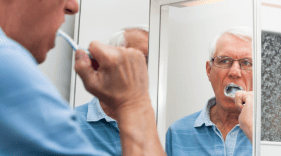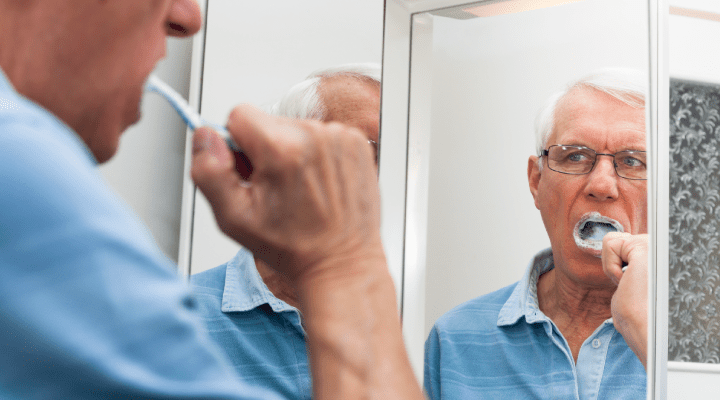Oral Health and Preventive Measures for Loved Ones with Alzheimer’s

When an individual with Alzheimer’s starts to exhibit symptoms of Alzheimer’s disease, tasks that were once second nature can suddenly become challenging. Even daily routines, such as brushing and flossing, can be hard to remember – which is why gum disease and tooth decay are common in Alzheimer’s patients.
To help a friend or family member with Alzheimer’s or dementia maintain their oral health, here are a few tips for you, other family members and nurses to consider.
- Write short, step-by-step instructions for brushing and flossing that your loved one can reference, then post them in the bathroom, preferably near the sink. Make sure the instructions go through the whole process: Start with locating the toothbrush in the bathroom, picking it up and applying a pea-sized amount of toothpaste, brush for two minutes and finish with spitting, rinsing teeth with water and storing the toothbrush.
- Invest in a toothbrush and floss that make oral health care easier. Most electric toothbrushes have a timer so your loved one will know how long to brush. For those with limited dexterity, electric toothbrushes and floss holders may be easier to manage than the standard varieties.
- Physically demonstrate how to brush and floss teeth. You can have your friend or family member watch as you practice on yourself, or help guide their hand as they brush and floss.
- Keep track of your loved one’s oral health care. Be aware of any oral discomfort or pain, especially during mealtime and while brushing or flossing teeth.
- Make sure to schedule regular dentist visits. If a full-time care facility becomes necessary, be sure to ask the facility how they handle dental care.
- Alzheimer’s and dementia medications, such as antidepressants and anti-psychotics, often cause dry mouth, which can lead to plaque build-up and eventually gum disease.[1] Make sure your loved one has access to water and leave them reminders to take sips throughout the day. If you have nursing care, it may also be helpful to remind staff that plenty of water is essential.
If you notice a change in your loved one’s oral health, be sure to let their care team know so they can help determine the cause and get the issue treated quickly.
[1] http://www.webmd.com/oral-health/guide/oral-side-effects-of-medications#1
Related stories
-
Teeth are Food Tools, Not Power Tools
Everyone has done it at one time or another. You’re away from your scissors and you need … Read More
-
It’s the Year You Use Your Benefits Wisely
*Updated January 2022 It’s natural at the start of a new year to set resolutions to change … Read More
-
How Do Your Sweets Stack Up?
Halloween is one of the spookiest holidays for teeth — but all candies are not equally frightful. … Read More
Sign Up Now
Most Liked
- 1 Do Expiration Dates on Dental Products Matter? 305 Likes
- 2 Is Activated Charcoal Safe for your Smile? 166 Likes
- 3 Crazy and Cool Fish Teeth Facts 91 Likes
- 4 Delta Dental Protects Your Eyes with DeltaVision® Coverage 71 Likes
- 5 The In-between Tooth: Guide to Bicuspids 53 Likes
- 6 Recipe: Quick Pumpkin Pudding 49 Likes
- 7 Bad Taste After Brushing? Common Explanations 44 Likes
- 8 People with Dental Benefits are Healthier 39 Likes
- 9 Own Your Oral Health: Subscribe now for tips to ensure a bright smile 38 Likes
- 10 Signs of diabetic eye problems 36 Likes




